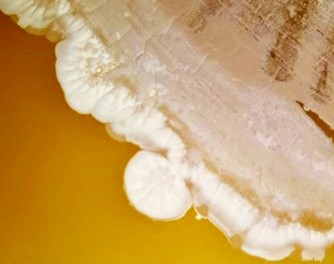Wednesday, 22 July 2020
Molecular microbiologists at the University of Nottingham are working with biotech firm Cyanetics and Public Health England (PHE) to discover a novel antiviral medication to effectively treat Covid-19.
In its first phase, the Innovate UK-funded project will rapidly screen strains of a harmless bacteria called Streptomyces, which is found in abundance in soil (and is even responsible for the pleasant earthy smell after it rains). Importantly, the microbe has the ability to produce natural compounds (called secondary metabolites) with potent therapeutic benefits.
Already used to produce many well-known antibiotics, Streptomyces exhibit not only antimicrobial but also valuable antiviral properties. This study aims to find a specific strain of Streptomyces that can effectively target SARS-CoV-2 - the novel coronavirus behind the current global pandemic.
To achieve this, scientists from Cyanetics will be using their laboratories in Stevenage to test over 100 Streptomyces species from a unique collection held by the Sustainable Processing Group (SPT) at the University of Nottingham.
Assistant Professor in White Biotechnology, Dr Samantha Bryan is custodian of the Streptomyces strains in question. She will lead a team of SPT researchers to support Cyanetics on the preliminary laboratory investigations in response to COVID-19.
“There is an urgent need to discover new and effective antivirals against SARS-CoV-2. Therefore, given the plethora of secondary metabolites that Streptomyces produce, they're an untapped resource for new antiviral medications. Large-scale screening, such as the one we are undertaking, increases the likelihood of identifying such antivirals.”
In phase two of the six-month project, researchers will send a shortlist of some 40 viable compounds that may inhibit in vitro replication of the SARS-CoV-2 virus in cell culture to PHE scientists for further testing towards drug development.
 Photograph of a representative agar plate demonstrating macroscopic colony phenotype of Streptomyces sp. The strains were grown on oatmeal agar plates for three days at 30 °C
Photograph of a representative agar plate demonstrating macroscopic colony phenotype of Streptomyces sp. The strains were grown on oatmeal agar plates for three days at 30 °C
Story credits
More information is available from Dr Samantha Bryan at Samantha.bryan@nottingham.ac.uk or Daniel Read on Daniel.read@cyanetics.uk or 01438 79104 or Emma Lowry, Media Relations Manager (Engineering) on emma.lowry@nottingham.ac.uk
Notes to editors:
About the University of Nottingham
Ranked 97 in the world and 17th in the UK by the QS World University Rankings, the University of Nottingham is a founding member of Russell Group of research-intensive universities. Studying at the University of Nottingham is a life-changing experience, and we pride ourselves on unlocking the potential of our students. We have a pioneering spirit, expressed in the vision of our founder Sir Jesse Boot, which has seen us lead the way in establishing campuses in China and Malaysia - part of a globally connected network of education, research and industrial engagement.
Nottingham was crowned Sports University of the Year by The Times and Sunday Times Good University Guide 2024 – the third time it has been given the honour since 2018 – and by the Daily Mail University Guide 2024.
The university is among the best universities in the UK for the strength of our research, positioned seventh for research power in the UK according to REF 2021. The birthplace of discoveries such as MRI and ibuprofen, our innovations transform lives and tackle global problems such as sustainable food supplies, ending modern slavery, developing greener transport, and reducing reliance on fossil fuels.
The university is a major employer and industry partner - locally and globally - and our graduates are the third most targeted by the UK's top employers, according to The Graduate Market in 2024 report by High Fliers Research.
We lead the Universities for Nottingham initiative, in partnership with Nottingham Trent University, a pioneering collaboration between the city’s two world-class institutions to improve levels of prosperity, opportunity, sustainability, health and wellbeing for residents in the city and region we are proud to call home.
More news…